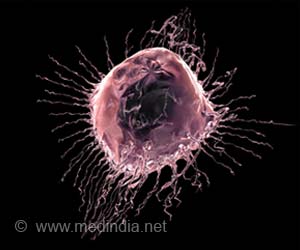After reporting excess calcium as an indicator of prostate cancer, researchers at Wake Forest University School of Medicine and the University of Wisconsin have now identified an even
Excess calcium was the first. Now a second and more powerful indicator of prostate cancer has been found by researchers at Wake Forest University School of Medicine and the University of Wisconsin life-threatening levels of ionised serum calcium.
The new finding can help provide some direction for men diagnosed with prostate cancer, about whether their cancer is likely to be fatal or not."Scientists have known for many years that most prostate cancers are slow-growing and that many men will die with, rather than of, their prostate cancer," said Dr. Gary G. Schwartz, senior author of the study.
He added: "The problem is, how can we determine which cancers pose a significant threat to life and need aggressive treatment versus those that, if left alone, are unlikely to threaten the patient's life? These findings may shed light on that problem."
This is the first time that any study has examined fatal prostate cancer risk in relation to pre-diagnostic levels of ionised serum calcium.
The researchers found that men in the highest third of ionised serum calcium levels were three times more likely to die of prostate cancer than those with the least amount of ionised serum calcium.
Also, they confirmed a previous finding of a doubling of risk for fatal prostate cancer among men whose level of total serum calcium falls in the highest third of the total serum calcium distribution.
Advertisement
Dr. Halcyon G. Skinner, of the University of Wisconsin, the study's lead author, said that the findings had both scientific and practical implications.
Advertisement
And practically speaking, the finding may offer some guidance to men trying to decide whether or not to seek treatment for a recent prostate cancer diagnosis.
If confirmed, the findings could also lead to the general reduction of over-treatment of prostate cancer.
"These results do not imply that men need to quit drinking milk or avoid calcium in their diets," Schwartz added.
The study appears in the journal Cancer Epidemiology, Biomarkers and Prevention.
Source-ANI
TAN/SK





![Prostate Specific Antigen [PSA] Prostate Specific Antigen [PSA]](https://www.medindia.net/images/common/patientinfo/120_100/prostate-specific-antigen.jpg)







